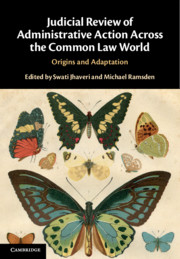Book contents
- Judicial Review of Administrative Action across the Common Law World
- Judicial Review of Administrative Action across the Common Law World
- Copyright page
- Contents
- Contributors
- Foreword
- Acknowledgments
- Table of Cases
- Table of Legislation
- Abbreviations
- Part I Introduction
- Part II Origins and Adaptations of Judicial Review in England
- 2 English Administrative Law History: Perception and Reality
- 3 Modern Threats to English Administrative Law and Implications for Its Export
- 4 International Influences on English Judicial Review and Implications for the Exportability of English Law
- Part III Origins and Adaptations in the British Isles
- Part IV Origins and Adaptations in North America and Canada
- Part V Origins and Adaptations in the Middle East and Africa
- Part VI Origins and Adaptations in Asia
- Part VII Origins and Adaptations in Australasia
- Part VIII Conclusion: Interrogating “Common Law” Approaches to Judicial Review
- Index
3 - Modern Threats to English Administrative Law and Implications for Its Export
from Part II - Origins and Adaptations of Judicial Review in England
Published online by Cambridge University Press: 19 March 2021
- Judicial Review of Administrative Action across the Common Law World
- Judicial Review of Administrative Action across the Common Law World
- Copyright page
- Contents
- Contributors
- Foreword
- Acknowledgments
- Table of Cases
- Table of Legislation
- Abbreviations
- Part I Introduction
- Part II Origins and Adaptations of Judicial Review in England
- 2 English Administrative Law History: Perception and Reality
- 3 Modern Threats to English Administrative Law and Implications for Its Export
- 4 International Influences on English Judicial Review and Implications for the Exportability of English Law
- Part III Origins and Adaptations in the British Isles
- Part IV Origins and Adaptations in North America and Canada
- Part V Origins and Adaptations in the Middle East and Africa
- Part VI Origins and Adaptations in Asia
- Part VII Origins and Adaptations in Australasia
- Part VIII Conclusion: Interrogating “Common Law” Approaches to Judicial Review
- Index
Summary
This chapter starts with a salute to the classic administrative law and to the English judges who in a series of bold and scintillating judgments in the 1960s cast the mantle of the rule of law over the exercise of discretionary power. This was achieved using the organising principle of jurisdiction; all depends on whether the decision-maker acts within the power granted by Parliament. This classic administrative law forms the basis of the dialogue between English law and other common law jurisdictions as they indigenised their administrative law in accordance with their own constitutional context. But the foundations of English Administrative law are under threat. While a frontal attack on the sovereignty of Parliament is not anticipated judges sometimes pay lip service to supremacy but in fact do not heed the clear purpose of the legislature. The majority judges in Evans v Attorney-General did not heed the clear intent of the legislature. Here one sees imaginative and sophisticated approaches to interpretation being deployed to deny Parliament’s will. Classic administrative law is also under threat from the tendency in the Supreme Court not to lay down clear rules that can be followed in the future by lower courts and individuals seeking a guide to their conduct. Instead the outcome of legal disputes is made dependent upon the exercise of judicial discretion to the detriment of legal certainty. A spectacular example of this is Cart v. The Upper Tribunal where the question whether a decision is within jurisdiction becomes a matter of judicial discretion. In effect law is replaced with judicial discretion and classic administrative law disappears. The decline in legal certainty occasioned by the enactment of the Human Rights Act 1998 exacerbates this tendency. As English law moves towards a pragmatic mode of reasoning in which the wise exercise of judicial discretion becomes the paramount consideration, it will become less relevant in jurisdictions that remain loyal to the classic law.
Keywords
- Type
- Chapter
- Information
- Judicial Review of Administrative Action Across the Common Law WorldOrigins and Adaptation, pp. 46 - 59Publisher: Cambridge University PressPrint publication year: 2021



